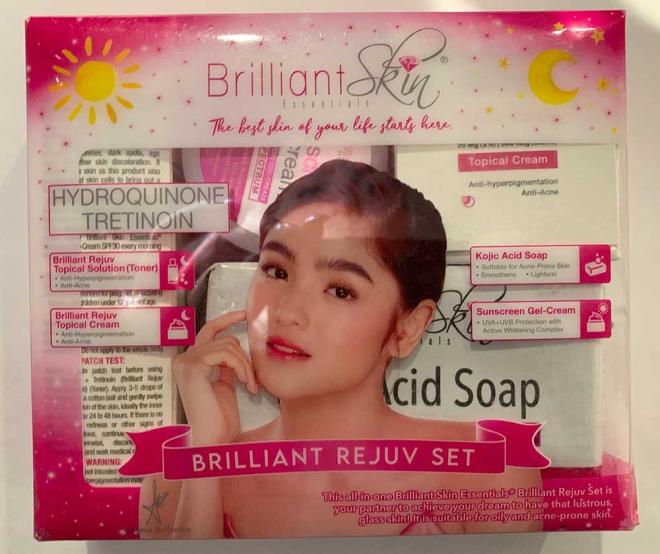Health Canada is warning against the use of unauthorized skin-lightening products with “dangerous ingredients” that keep showing up in Canadian stores and online.

The agency issued an updated public advisory Monday for five products by Philippine brand Brilliant Skin Essentials that were being sold in Alberta. The creams and toners in question have been pulled from the market.
Health Canada said the products “may pose serious health risks” because they contain or have been labelled to contain “dangerous ingredients,” such as hydroquinone and tretinoin.
Canadians should stop using the listed products and consult a health-care professional if they have used them and have health concerns, and for advice, Health Canada said.
This is not the first time that unauthorized skin-lightening products have been seized from the market by Health Canada.
Brilliant Skin Essentials products were also removed from warehouses in Alberta and online sale last week, earlier in February, in January and last year.
“In Canada, skin-lightening products are regulated as drugs and they must be authorized by Health Canada before being sold on the Canadian market,” a Health Canada spokesperson told Global News in an emailed statement Wednesday.
“Selling unauthorized health products is illegal in Canada and the Department takes this matter very seriously and will continue to take action to stop this activity.”

The products from Brilliant Skin Essentials were flagged because of skin agents hydroquinone and tretinoin, which should only be used when prescribed or under the supervision of a health-care professional.
Dr. Ivan Litvinov, a dermatologist at the McGill University Health Centre (MUHC) and president of the Skin Research Group of Canada, said a lot of these agents tend to be used by women of reproductive age to remove any unwanted blotches, which is why it’s very important to know the potential risks.
“People are looking at magazines and expect perfection and they don’t realize that a lot of those images are actually photoshopped or altered in some ways,” he told Global News.
“I think what we ultimately all want is healthy skin and sometimes healthy skin has some pigmentary alterations.”
Side effects of skin-lightening products
Hydroquinone helps to lighten darkened areas of skin, while tretinoin is used to treat acne, according to Health Canada.
These are “good agents” but can also “cause harm, which is why they are regulated by Health Canada and they require a prescription from a health professional,” said Litvinov.
Pregnant people or those who are breastfeeding should refrain from using hydroquinone and tretinoin, Health Canada says.
The “excessive use” of tretinoin can cause birth defects and risks harming the baby, which is why its use is ill-advised for expecting mothers, said Litvinov.
People with sensitive skin may also experience side effects like stinging and burning from applying tretinoin, he said.
In addition, this prescription drug can also cause pain, irritation, itchiness, redness or swelling, and damage the skin or change its colour, Health Canada warns in its advisory.

Also, tretinoin can exacerbate some skin conditions on the face, such as seborrheic dermatitis and irritant contact dermatitis, said Litvinov.
He said that as a form of treatment, tretinoin and hydroquinone are usually combined, but none of that is given to patients without a “thorough evaluation, making sure they don’t have underlying conditions that can worsen.”
For a concentration greater than two per cent, a prescription is required for hydroquinone.
Its use in cosmetics applied to the skin is already banned in Canada.
Similar to tretinoin, hydroquinone can also cause a range of skin reactions as side effects, including but not limited to peeling, blisters and scarring.
“Copious amounts” of hydroquinone can cause something called exogenous ochronosis, which turns the skin dark blue, said Litvinov.
And it may take months to years to get rid of the pigment, he added.
How to treat skin pigmentation disorders
There are a number of treatments that dermatologists use for people with darkened skin or other pigmentary imperfections.
The first line of defence is sunscreen, said Litvinov, because a lot of conditions are caused by sun exposure.
Beyond that, there are a number of “camouflage treatments” that have been developed for patients suffering from vitiligo, a disorder that causes the skin to lose its colour.

Litvinov recommended using a dermatologist-recommended camouflaging makeup to help cover any unwanted blotches.
Topical products like tretinoin — if prescribed — and a variety of peeling acids are also commonly used for this condition.
Otherwise, people can also use tranexamic acid — taken either orally or by injection as advised by their physician — to treat any pigmentary changes.
“And then if nothing works, then we go to more expensive … treatments which include lasers.”




Comments